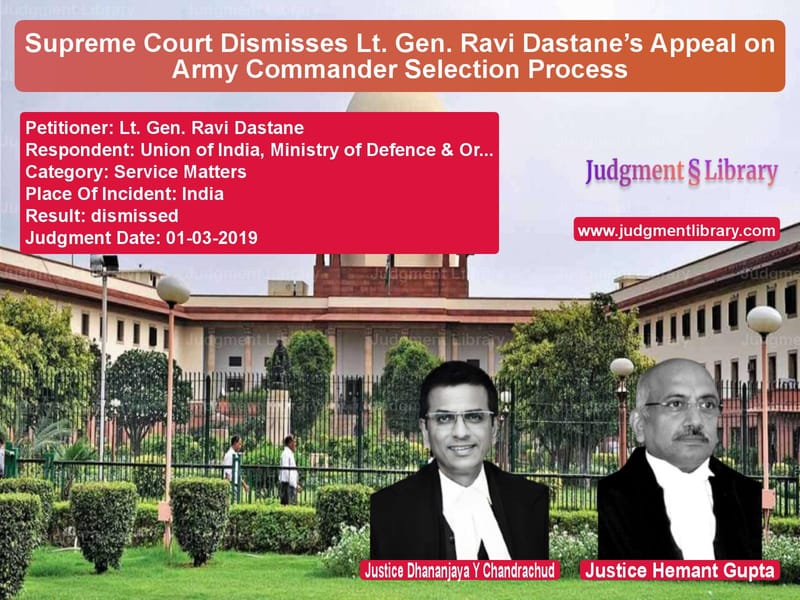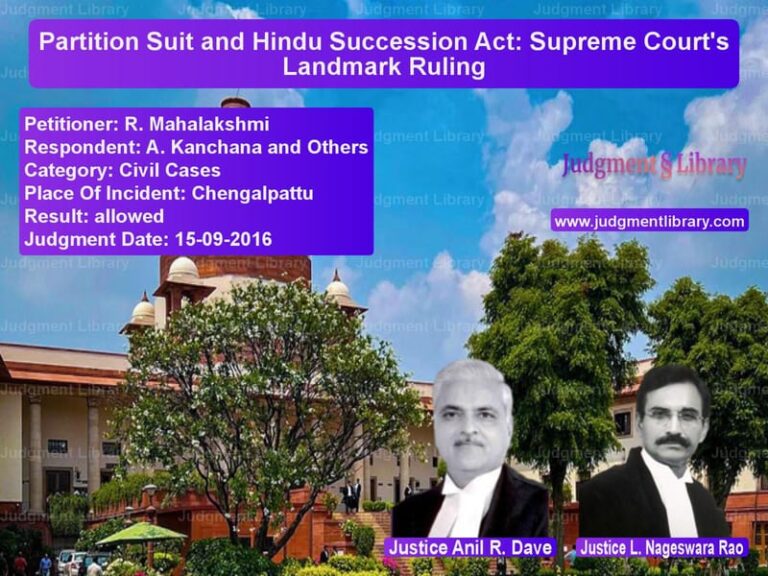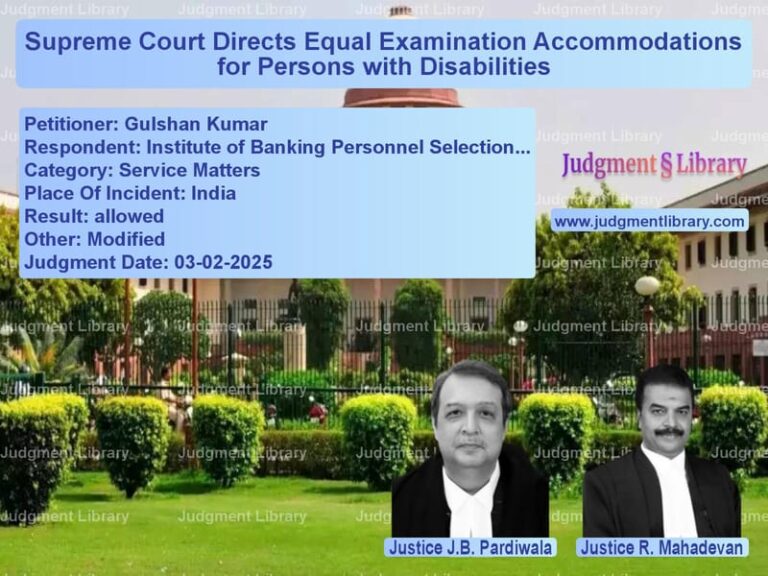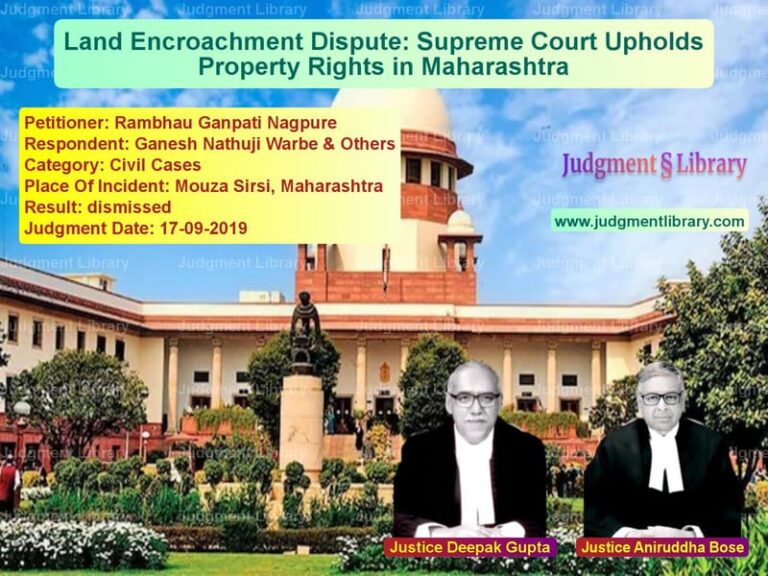Supreme Court Dismisses Lt. Gen. Ravi Dastane’s Appeal on Army Commander Selection Process
The Supreme Court of India delivered a crucial judgment in the case of Lt. Gen. Ravi Dastane vs. Union of India & Ors., where the appellant challenged the selection of Lieutenant Generals Dalbir Singh and Sanjiv Chachra as Army Commanders. The case brought up significant legal questions regarding the fairness and transparency of military promotion policies, particularly for high-ranking positions such as Army Commanders.
This judgment reiterates the principle that selection to high-level military posts must be based on merit and suitability rather than automatic seniority. The ruling reaffirms that seniority alone does not confer the right to a promotion and that the government holds discretionary power in appointing military leadership positions.
Background of the Case
Lieutenant General Ravi Dastane was among the senior-most officers considered for promotion to the post of Army Commander. In March 2012, the then Chief of Army Staff (COAS), General V.K. Singh, initiated the selection process to fill two upcoming vacancies for Army Commanders. Seven Lieutenant Generals, including Lt. Gen. Dastane, were reviewed for their eligibility.
The seven senior-most officers under consideration were:
- Lt. Gen. Dalbir Singh
- Lt. Gen. Sanjiv Chachra
- Lt. Gen. Ravi Dastane
- Lt. Gen. J.P. Nehra
- Lt. Gen. Philip Campose
- Lt. Gen. A.S. Chabbewal
- Lt. Gen. Ashok Singh
Ultimately, the COAS recommended Lt. Gen. Dalbir Singh and Lt. Gen. Sanjiv Chachra for promotion as Army Commanders for the Eastern and Western Commands, respectively. The recommendation was approved by the Ministry of Defence (MoD) and later by the Appointments Committee of the Cabinet (ACC).
Lt. Gen. Dastane, who was next in line for consideration, filed a statutory complaint in August 2012, contending that the selection process was flawed and biased. When his complaint was rejected by the Union Government on January 31, 2013, he approached the Armed Forces Tribunal (AFT), seeking to overturn the appointments and to be considered for an Army Commander post himself.
The AFT dismissed his appeal in September 2013, ruling that the selection process followed due procedure. Dissatisfied, Lt. Gen. Dastane then filed a Civil Appeal before the Supreme Court.
Arguments by the Petitioner (Lt. Gen. Ravi Dastane)
The appellant, Lt. Gen. Dastane, argued that the selection process violated established guidelines. His main arguments were:
- The promotion was based solely on seniority rather than comparative merit.
- The selection should have included all eligible officers and not been limited to two recommendations.
- By failing to consider him, the authorities denied him a fair and equal opportunity.
- There was no transparency in the evaluation process, as the selection criteria were not disclosed.
- The government’s approval of the appointments without proper scrutiny violated procedural fairness.
He further cited official policy guidelines that suggested two eligible candidates should be recommended for each vacancy, arguing that the government should have considered more officers rather than accepting only the two names recommended by the COAS.
Arguments by the Respondents (Union of India & Others)
The Union of India and the Ministry of Defence countered Lt. Gen. Dastane’s arguments, asserting that:
- The selection process followed all prescribed guidelines.
- Appointments were made based on a holistic assessment of officers’ records, leadership abilities, and organizational needs.
- Seniority was not the sole determining factor; suitability and experience were crucial considerations.
- The Appointments Committee of the Cabinet (ACC) had final discretionary authority.
- The government was under no obligation to consider every eligible officer, only those deemed most suitable.
The respondents emphasized that the selection process for Army Commanders is distinct from routine promotions, as it is a “selection-based” process rather than an automatic seniority-based one.
Supreme Court’s Observations
The Supreme Court extensively examined the service records, promotion policies, and procedural requirements governing Army Commander appointments. It made the following key observations:
- The role of an Army Commander is a selection-based appointment and not a routine promotion.
- Seniority, while a relevant factor, does not override considerations of merit and suitability.
- The selection process followed by the COAS and the Ministry of Defence was fair and legally sound.
- Lt. Gen. Dastane’s contention that he was entitled to a promotion merely because he was next in line had no legal standing.
- The government has the right to exercise discretion in high-ranking military appointments, subject to procedural fairness.
The Court observed:
“Selection to the post of Army Commander is based on merit and suitability. An officer does not have a vested right to promotion merely because of seniority.”
Final Judgment
The Supreme Court upheld the High Court’s ruling and dismissed Lt. Gen. Dastane’s appeal. The key rulings were:
- The selection of Lt. Gen. Dalbir Singh and Lt. Gen. Sanjiv Chachra was valid and legally sound.
- The appellant’s claims of unfair treatment were unsubstantiated.
- The Appointments Committee of the Cabinet acted within its authority in approving the promotions.
- Lt. Gen. Dastane had no inherent right to be promoted simply by virtue of being next in seniority.
The Court concluded:
“The government holds the discretion to appoint the most suitable candidate based on merit, organizational needs, and leadership qualities. The selection process does not require considering every eligible officer but only those deemed most appropriate for the role.”
Conclusion
This landmark ruling reinforces the legal position that military promotions to key leadership positions are based on selection rather than automatic seniority. The Supreme Court’s decision establishes that merit, leadership ability, and suitability are paramount considerations in high-level defense appointments. By dismissing the appeal, the Court reaffirmed the government’s authority to make discretionary selections for critical military roles while ensuring procedural fairness.
Petitioner Name: Lt. Gen. Ravi Dastane.Respondent Name: Union of India, Ministry of Defence & Ors..Judgment By: Justice Dhananjaya Y Chandrachud, Justice Hemant Gupta.Place Of Incident: India.Judgment Date: 01-03-2019.
Don’t miss out on the full details! Download the complete judgment in PDF format below and gain valuable insights instantly!
Download Judgment: Lt. Gen. Ravi Dastan vs Union of India, Mini Supreme Court of India Judgment Dated 01-03-2019.pdf
Direct Downlaod Judgment: Direct downlaod this Judgment
See all petitions in Promotion Cases
See all petitions in Public Sector Employees
See all petitions in Recruitment Policies
See all petitions in Judgment by Dhananjaya Y Chandrachud
See all petitions in Judgment by Hemant Gupta
See all petitions in dismissed
See all petitions in supreme court of India judgments March 2019
See all petitions in 2019 judgments
See all posts in Service Matters Category
See all allowed petitions in Service Matters Category
See all Dismissed petitions in Service Matters Category
See all partially allowed petitions in Service Matters Category







